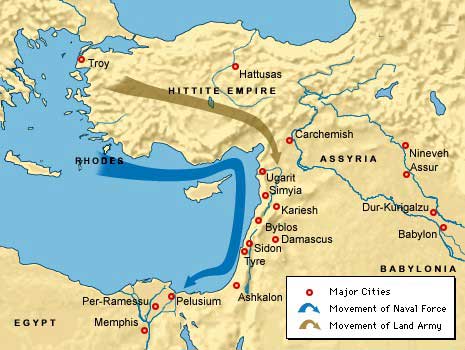
The last days of Ugarit are difficult to reconstruct in full. Michael Astour has written a brilliant article on the subject, and most of the information presented here is drawn from his paper. (Astour, M. New Evidence on the Last Days of Ugarit. American Journal of Archaeology, Vol. 69 No. 3. 1965. pp. 253-258) Ugarit was destroyed by the Peoples of the Sea, as the Egyptian called them. They wreaked havoc all over the Mediterranean in roughly 1200 BCE; the Hittites, Mycenean Greeks, Ugaritians, and many more states were destroyed by the forces of the Sea Peoples. The Egyptians managed to weather the storm. There was no social, political, or economic decay that preceded the fall of Ugarit, so the invasion must have been swift and brutal. Ammurapi’s letter to the king of Alashia perhaps records the first stages of the invasion:
“My father, behold, the enemy ships came (here); my cities (?) were burned, and they did evil things to my country. Does not my father know that all my troops and chariots (?) are in the Hittite country, and all my ships are in the land of Lycia?...Thus the country is abandoned to itself. May my father know it: the seven ships of the enemy that came here inflicted much damage upon us”
On the basis of this letter, Astour supposes that the enemy forces are still in the Aegean, but, the intentions of the enemy seem to be well known: the fleet of Ammurapi has sailed west to Lycia to block their passage into the Mediterranean. The Syrian rulers also seem to have started to hastily hammer out mutual assistance treaties such as this:
“…when they servant delivered (?) (thy) word to me. Whatever is thy desire Which thou lackest—I will Provide for my brother, And I too, whatever I l[a]ck—my brother Will load it there. And let my brother not Squander it.”
Another letter written by Ammurapi attests to the increasing flood of enemy forces, and appeals to the Hittite king for assistance:
“The enemy [advances] against us And there is no number […] Our number is pure (?) Whatever is available, look for it And send it to me.”
However, it was of no avail. The armies of Ugarit and Hatti were forced to retreat all the way to the Syrian border from Anatolia, all of which was lost almost up to Amanus. A letter from Ewir-Sharruma to the mother of the Ugaritic king provides us with a poignant human element to the invasion:
“(27) And behold, the enemies oppress me (28) But I shall not leave my wife (and) (29) My children…before the enemy.”
One can imagine the terror the average citizen (and the royalty as well) must have felt in facing the incoming tide of the Sea Peoples; their swiftness of movement is astounding. At this point, the enemy has probably crossed the Amanus and is in Mukish—just north of Ugarit. Ammurapi, writing to his mother, seems to hope that the Hittites will send more reinforcements to check the torrent of the invaders:
“(16) And if the Hittites Mount, I will send a message To thee, and if They do not mount, I will certainly send A message…”
Presumably he feels that the arrival of Hittite reinforcements will strengthen his precarious position; the Sea Peoples now being just north of the city. Ugarit, however, could not withstand the invasion and the city was destroyed c. 1190/1185 BCE. A letter to a certain Zrdn states,
“Our food in the threshing floors Is sacked (or: burned). And also the vineyards are destroyed. Our city is destroyed And mayest thou know it.”
On account of the invasion, the people of Ugarit were either killed or, if they managed to escape in time, fled inland or down the coast in an effort to escape the destruction. It is in this state that the once grand city of Ugarit was discovered nearly 3000 years later, in 1928, by a farmer and his plough.


No comments:
Post a Comment